Health Leaders and Hospital Administrators Vow To Work ‘Together in Mission’
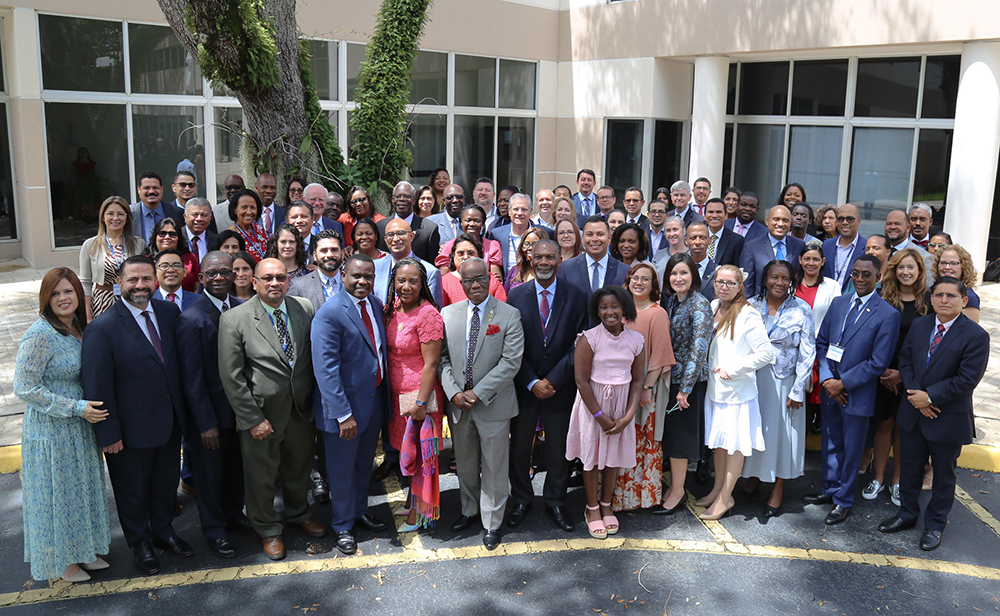
Adventist experts, church administrators, health directors and hospital administrators from throughout the Inter-American Division pose for a group photo during territory-wide Health Symposium held in Miami, Florida, United States, July 27-29, 2023. [Photo: Libna Stevens/IAD]
Seventh-day Adventist health ministries and healthcare institution leaders from throughout the Inter-American Division (IAD) vowed recently to work together to uphold and strengthen the health message across the territory. The commitment came as the IAD concluded its Health Symposium which highlighted the urgent need to touch the lives of people with ongoing spiritual, wholistic and preventive care as a vital part in the life of health institutions, the church, and the community.
“We must strengthen the spirit of oneness together,” said Franck Géneus, M.D., health ministries director of the IAD and president of Adventist Healthcare Services Inter-America AHSIA. “In the past, our Adventist hospitals and the church have worked separately in health community impact, but we must focus on moving forward together in achieving the mission,” he said. That togetherness needs to be an integration of Adventist communities and the healthcare services, churches and services and the entities of the healthcare system, he explained.
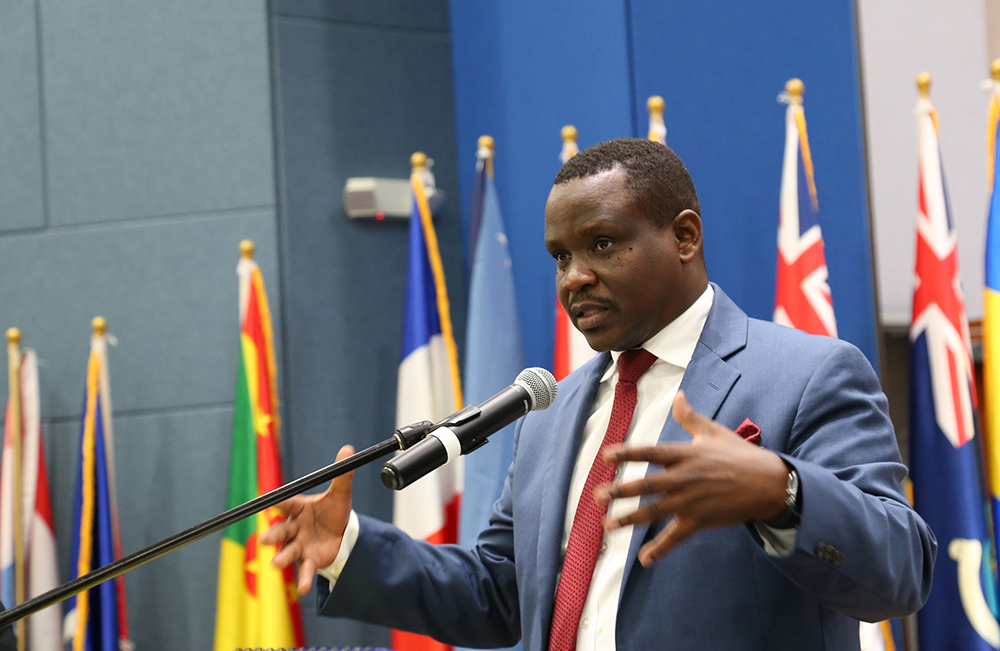
Franck Géneus, M.D., health ministries director of the Inter-American Division speaks on strengthening the synergy among hospitals clinics, local fields down to local church to reach the community. [Photo: Libna Stevens/IAD]
“What we are aspiring for is the integration between our Adventist faith, our philosophy, and the way we deliver our health services,” said Dr. Géneus. To accomplish that, there needs to be total involvement, meaning the church member must be an active health promoter, and each church a center of influence.
The symposium was all about maintaining a stronger synergy among the leadership in hospitals, clinics, and local fields down to local churches, as well as fostering a culture of improvement in healthcare service, said Géneus.
It was a clear message that echoed during the “Together in Mission” themed health symposium where more than 70 gathered in Miami, Florida, United States, and hundreds more watched online July 27-29, 2023.
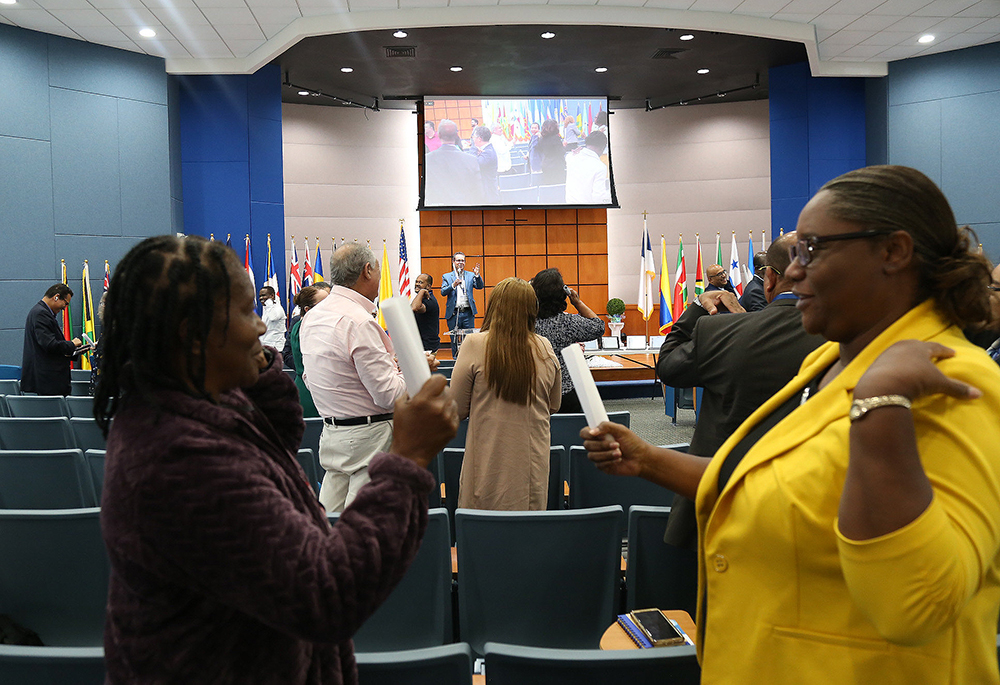
Health leaders interact during a session break on day two of the symposium. [Photo: Libna Stevens/IAD]
General Conference Health Ministries Director Peter Landless, M.D., reminded leaders to engage in healthful living, health education, and ensure that health institutions are part of the church’s outreach and health ministry. “We are living in a broken world filled with sickness, suffering, heartache and death and you are the one that Jesus is preparing to use,” said Dr. Landless.
The time is coming, said Landless, “where there will be no more work done in ministerial lines but health ministries,” he said. “You and I have that privilege of being part of comprehensive health ministries today.”
Health experts and administrators discussed ways of implementing healthcare services integration, governance models for the Adventist hospitals under AHSIA, promoting quality assurance and patient safety culture, training development and digital technology in hospitals, looking at vision, plans and resources available, as well as workshops on fundraising, risk management, the Dream Health Application, and more.
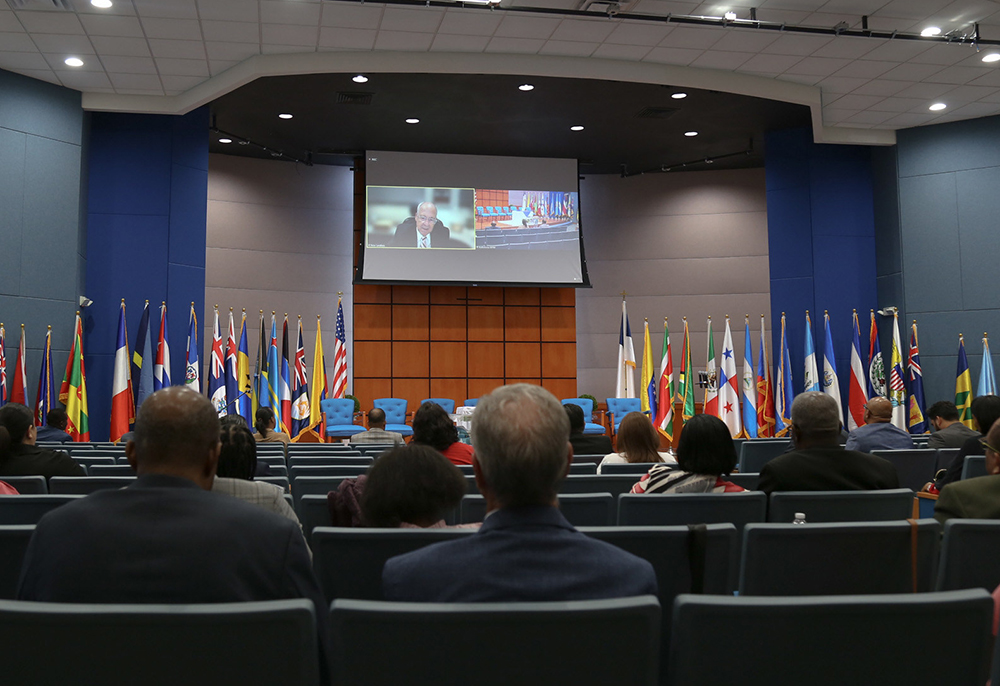
General Conference of Health Ministries Director Peter Landless, M.D., speaks to symposium attendees via online during a charge message on Jul. 29, 2023. [Photo: Libna Stevens/IAD]
For Marielis Guerra, administrator of the Bella Vista Hospital, in Mayaguez, Puerto Rico, one of the oldest of the 14 Adventist-operated healthcare institutions in the Inter-American Division, and the only one to have Joint Commission accreditation since 1980, managing a health care facility with over 560 employees is not easy. Ensuring that the hospital follows a functioning structure, offers competitive salaries, improves its processes, and expands to provide more medical services in a changing environment, takes a lot of collaboration. Collaboration and integration was something that she heard throughout the health symposium.
According to Guerra, community outreach in the form of health clinics has always been part of what Bella Vista Hospital has been involved in, but with the changes that the pandemic brought and the employee turnover that resulted, things need to be put into a stronger mission perspective.
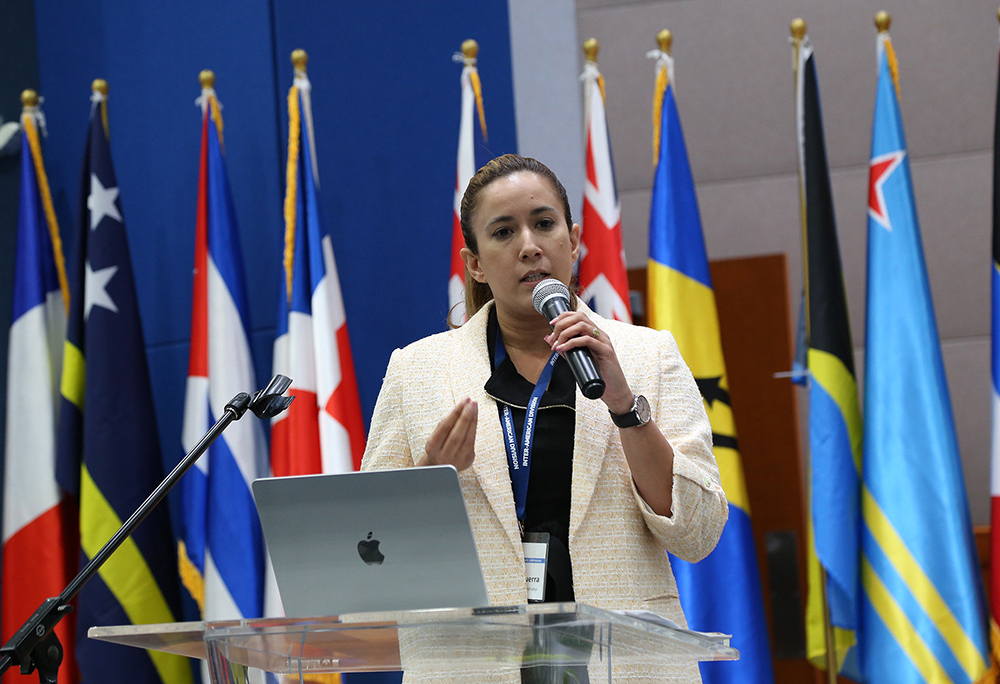
Marielis Guerra, administrator of Bella Vista Hospital, in Mayaguez, Puerto Rico, speaks briefly on initiatives implemented in the health institution. [Photo: Libna Stevens/IAD]
That mission is going to help the 225-bed hospital move forward in many ways as it moves to expand its endoscopy services, orthopedic surgeries, and gastroenterology services, as well as other services.
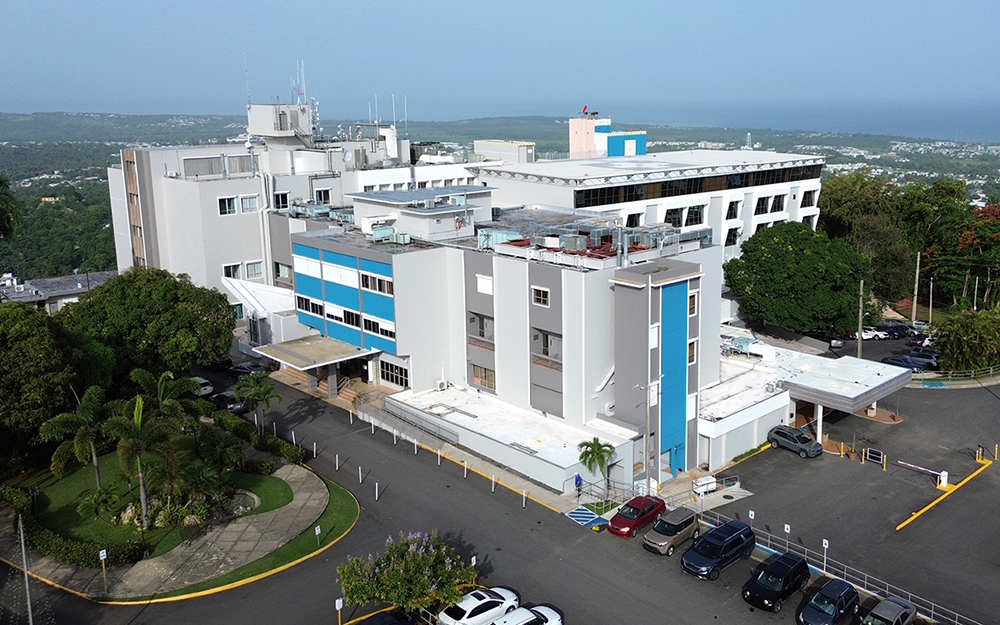
Aereal view of Bella Vista Hospital established in Mayaguez, Puerto Rico, since 1954, holds Joint Commission accreditation since 1980. The hospital was recently repainted in the 225-bed facility. [Photo: Courtesy of Bella Vista Hospital]
The pressures of growing, expanding services and strengthening the structure of the Valle de Angeles Hospital in Honduras has been present in the mind of Reynaldo Canales, who has been the administrator of the health institution for over eight years. Coming out of the years when the institution struggled financially to pay staff salaries, to where the hospital is growing financially and is beginning the process of applying for Joint Commission accreditation, has been a blessing to see.
Rubbing shoulders with church leaders and experts during the symposium brought more awareness that the mission can be better accomplished together, in closer collaboration. “We have to, as employees and administrators, be instruments of good to achieve the mission of providing healing, but through integral health, physical and spiritual health,” said Canales. It’s about this evangelization mechanism, he said. Sometimes we forget because of the business side of running a hospital, but we must always be connected to the mission.”
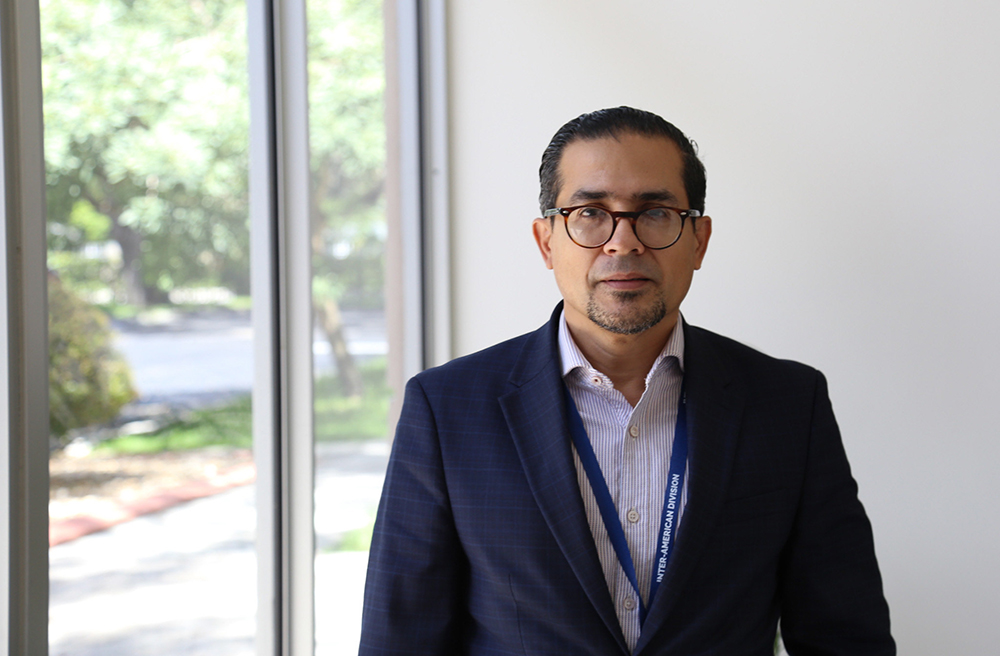
Reynaldo Canales, administrator of Valle de Angeles Hospital in Honduras has seen challenges as opportunities to increase development plans and expand any institution[Photo: Libna Stevens/IAD]
The 27-bed health care institution grew from 30 full time employees to 120 and is increasing its monthly impact in the community through health brigades and open clinics, he said. Canales said he dreams of having the hospital obtain quality accreditation, that it can be distinguished for its spiritual legacy, and become the strong right hand of the Adventist Church in the community, as well as see it expand to an outpatient clinic in Tegucigalpa, the capital city of Honduras. Challenges need to be seen as opportunities for greater mission, he said. “We must be agents of change because we have a light to share and to guide others,” Canales said.
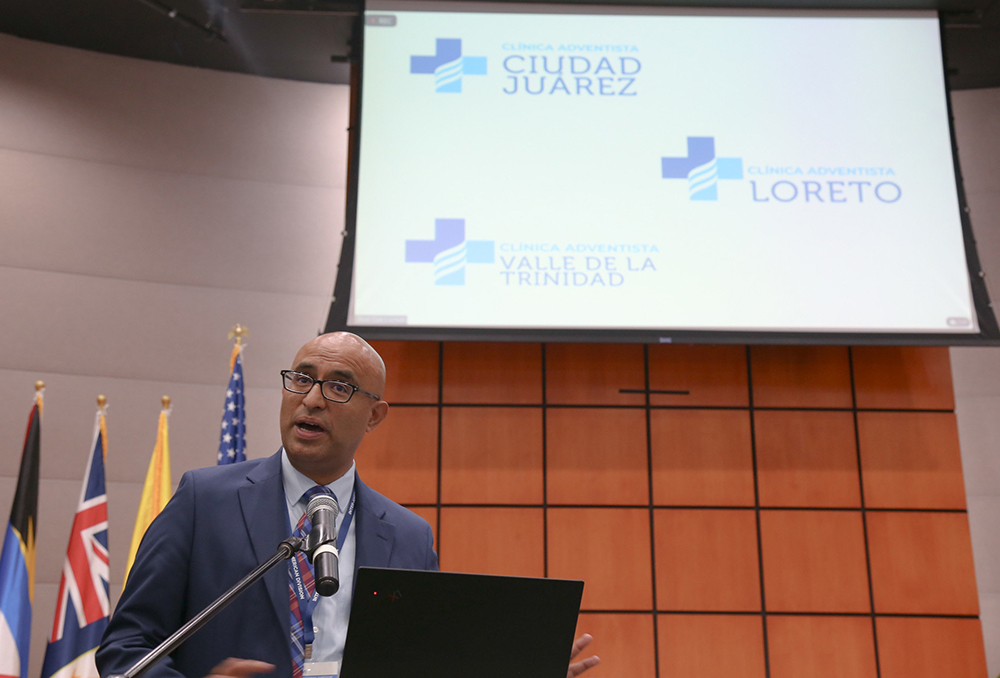
Roel Cea, M.D., health ministries director of the North Mexican Union director of health promoting universities in Mexico, talks about the plan to unify and improve Adventist clinics across the union. [Photo: Libna Stevens/IAD]
Health leaders, professionals and advocates at this year’s health symposium also looked at integrating the health ministry with the mission to evangelize, educate and serve the world, implementing a lifestyle service center, empowering health promoters, and activating community involvement, as well as implementing spiritual and preventive care, as well.
Integrating heath ministries in the North Mexican Union territory has seen the church starting to bring together more than 10 clinics which have been running or surviving for years, said Roel Cea, M.D., health ministries director of the North Mexican Union and director of health promoting universities in Mexico. It’s about the medical missionary ministry all functioning under a network of Adventist clinics, he said. An assessment is made for each participating clinic under a business plan, specific branding, target services for the community, each with a pastor or chaplain, and room for spiritual care, explained Cea.
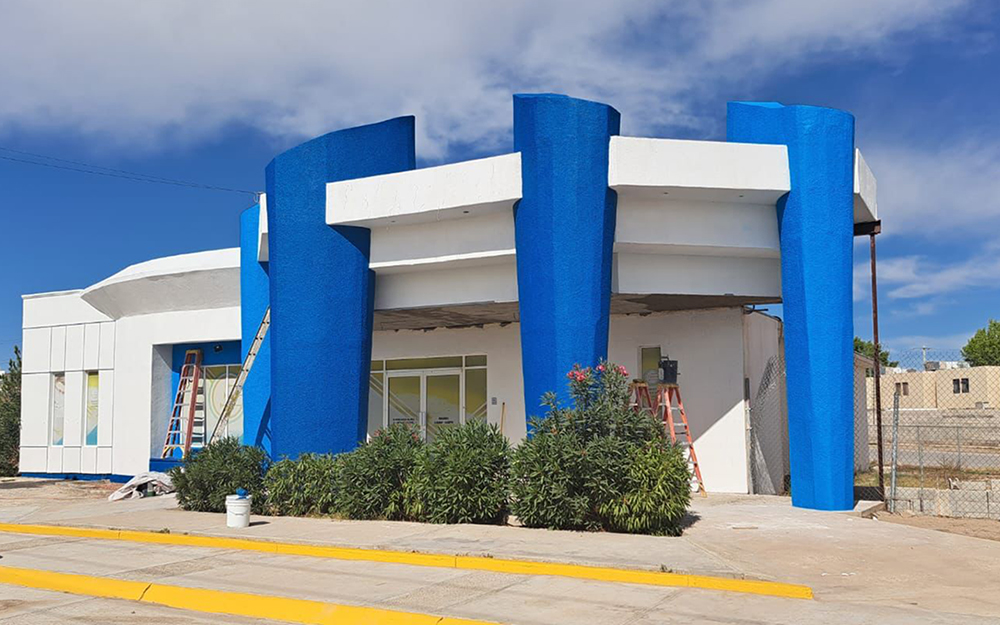
Juarez Adventist Clinic in Ciudad Juarez in Chihuahua, Mexico, gets a fresh coat of paint as it becomes the first clinic to be part of growing network of health care centers in the North Mexican Union. [Photo: Courtesy of Roel Cea]
Fostering collaboration and integration
“The clinics have an intentional connection with the local church because church members assist, the clinic goes to the church and health professionals support as well,” said Dr. Cea. Several of the clinics were suffering financially but are now able to be more self-sufficient, thanks to several assessments including from Adventist Health support. The plan is to have five Adventist clinics be part of the growing network of clinics by the end of the year and tackle five more next year, explained Cea. “What has been key is to reinforce the collaboration, working together and focus more on integrating the mission of the medical and health ministry in every activity and impact for the community,” Dr. Cea said.
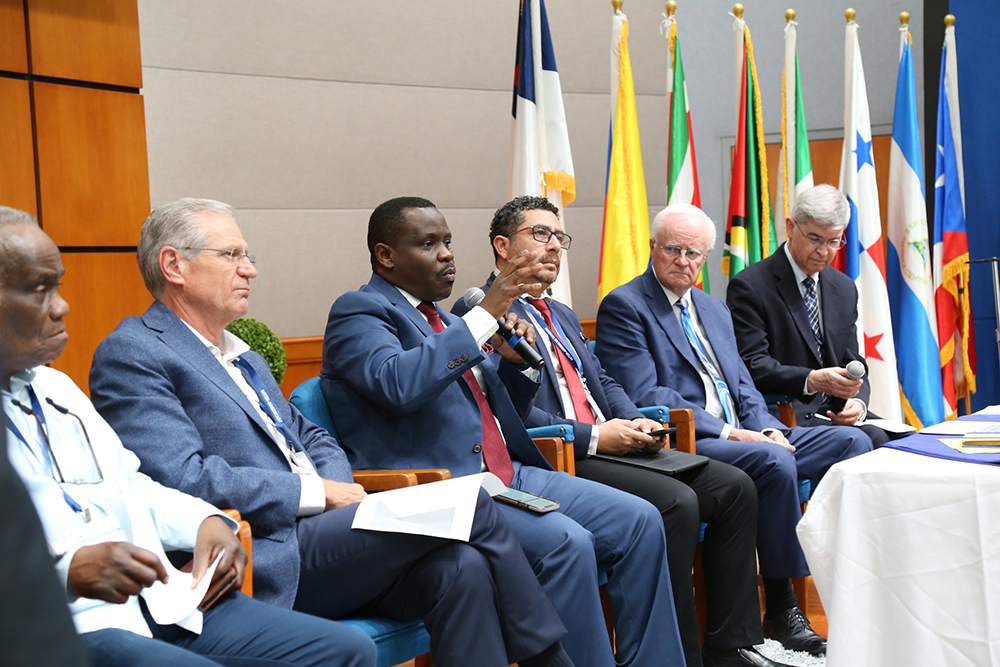
Dr. Franck Géneus, health ministries director of the IAD speaks during a panel discussion on July 29, 2023. [Photo: Libna Stevens/IAD]
As the event concluded, Dr. Géneus challenged hospital administrators and health ministries leaders to reach at least one million people through health brigades, health expos, and other comprehensive health ministries activities during 2024. “We have probably reached that number before but we didn’t really document it. Let’s work on ensuring that we touch thousands of lives with the health message,” Géneus said. “Adventist health ministries initiatives are powerful tools to achieve God’s mission.”
To view the list of keynote guest speakers, as well as resources during Inter-America’s Health Symposium, go to health.interamerica.org
To view a photo gallery of the three-day event, click HERE